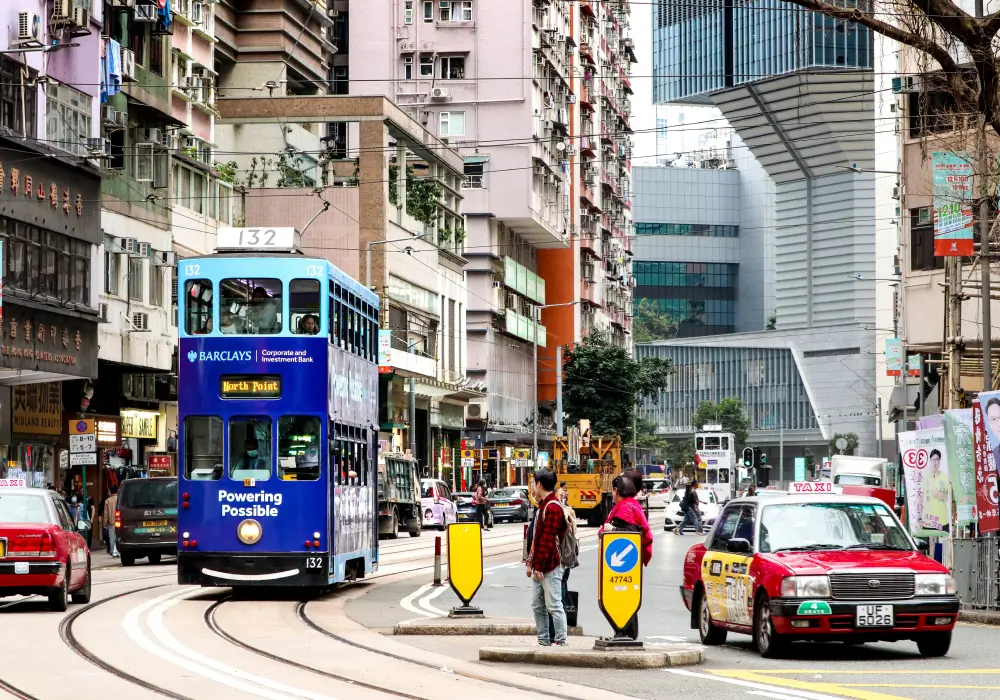
The Essentials for a Smooth Move to Hong Kong
- 26 Jun 2023
- Living & Tax
So you've packed your boxes, set a moving date, and you're ready to start a new chapter in Hong Kong. Before you take off, it's best to get your ducks in a row and take care of everything you can while you're still in your current location. This way, your transition into your new life in Hong Kong will be a breeze. We've put together a list of things to help you out along the way.
Chapter 1: Transportation
Once you've settled in and are ready for an adventure, Hong Kong's excellent transport system allows you to explore the city effortlessly. The city boasts a well-connected MTR and public transport system which includes buses, trams, ferries, and minibuses known as "Siu Ba" by locals. Taxis are also affordable and plentiful and run until the early hours of the morning. Navigating the city couldn't be easier! You can find more information about public transport in Hong Kong by clicking the link, or check out a list of travel apps to help you get around.
If you're considering driving a car in Hong Kong, and if your driving licence is issued by any of these approved countries or places, you can easily apply for a full driving licence without taking a test. To qualify, your current driving licence must be valid or has not expired for more than 3 years, and must have been obtained by passing a driving test held in the issuing place. You should also have resided in the overseas country or place of issue for at least 6 months during which the licence was issued, held the licence for 5 years or more prior to the application, or hold a passport or equivalent travel document of the issuing country.
To apply for a driving licence, simply fill in a TD63A application form, submit it to the Hong Kong Licensing Office, and you'll soon be ready to hit the road.
If you cannot exchange your driver's licence, you will need to take a driving test. To apply, complete a TD555 form and submit it along with supporting documents, such as your HKID card, proof of residence and fees, at the nearest licensing office. The driving test in Hong Kong comprises a multiple-choice written test and a road test, similar to many other places.
Upon receiving a valid driving licence in Hong Kong, you may consider purchasing your own car and you’ll need to obtain a vehicle licence. To apply for vehicle licences, you must, first of all, complete the relevant application forms online, or at the enquiry counter of any of the Licensing Offices of the Transport Department, the Home Affairs Department Public Enquiry Service Centres, or Post Offices. After you have completed the application form, forward it, together with relevant supporting documents and the appropriate fee to the licensing offices concerned.
Chapter 2: Healthcare
The public healthcare system in Hong Kong is known for its affordability and high quality, with hospital stays costing as low as HK$100-120 (US$13-15.50) per day and a minimal admission fee of HK$75 (US$9.55) for HKID holders. Moreover, in 2019, the HKSAR government introduced a Voluntary Health Insurance Scheme (VHIS) policy initiative, which provides universal coverage to both expats and locals who wish to avail of private healthcare services.
Enrolling in the right healthcare scheme is essential. For non-locals, there are certified plans available from different insurance companies. Top-tier insurance providers like AIA International, AXA, Blue Cross, Bupa, Prudential, and Sun Life offer VHIS plans that can be compared on the Consumer Corner section of the vhis.gov.hk website to find the best deal for you and your family. Once you become a Hong Kong resident, subscribing to VHIS not only offers universal coverage but also a tax reduction.
Chapter 3: Banking
To live and work in Hong Kong, you’ll also need to open a Hong Kong bank account. As a banking and finance hub, there are many options to choose from, with more than 250 banks based in the city.
If it's your first bank account in Hong Kong, you shall not be able to open it online due to the country’s strict anti-money laundering rules – but there are exceptions. If your home bank has branches in both your home country and Hong Kong, like HSBC and Citibank for example, you may be able to open your account remotely. Otherwise, it's necessary to visit a local bank branch and set up the account in person.
The process is straightforward. Don’t forget to bring along your passport, HKID, proof of address such as a utility bill, bank statement, or even a mobile phone bill, and your home country's address proof if you haven't yet settled in Hong Kong. In addition, you’ll also need to show a valid working visa, work contract or letter of employment. Note that most banks charge a monthly account maintenance fee ranging from HK$50 to HK$150, if the account holder does not meet the minimum account balance, generally around HK$10,000.
For more information about opening personal and business accounts at 20 major retail banks in Hong Kong, check out the list by Hong Kong Monetary Authority.
Proper planning is crucial for a seamless move, which is why it's essential to sort out your driver’s licence, health insurance, and bank account remotely before the big move. This way, you can focus on immersing yourself in the local culture and customs and becoming a legitimate resident of Hong Kong. Embrace the city's unique atmosphere and make the most of your experience!
Recent posts
-

Move to Hong Kong: Enjoy all-inclusive living amenities with family
- 31 Dec 2024
- Living & Tax
-

Hong Kong’s support for innovation and technology
- 20 Dec 2024
- Economic Developments & Potentials
-

Guide for non-local graduates seeking employment in Hong Kong
- 18 Dec 2024
- Living & Tax
-

The growing esports and gaming market in Hong Kong
- 29 Nov 2024
- Economic Developments & Potentials
-

Hong Kong's rise as a FinTech hub
- 28 Oct 2024
- Economic Developments & Potentials
-

Mastering market trends in Hong Kong to stay ahead of the curve
- 24 Oct 2024
- Economic Developments & Potentials
-

Tips for a stress-free relocation to Hong Kong
- 22 Oct 2024
- Living & Tax
-

Cost of Living in Hong Kong: accommodation, food, and transportation
- 15 Oct 2024
- Living & Tax
-

Elevate your creative career at the global stage of innovation in performing arts and art events
- 07 Oct 2024
- Economic Developments & Potentials
-

Thrive in Hong Kong: A promise of a clean and fair society for global talent
- 04 Oct 2024
- Living & Tax

